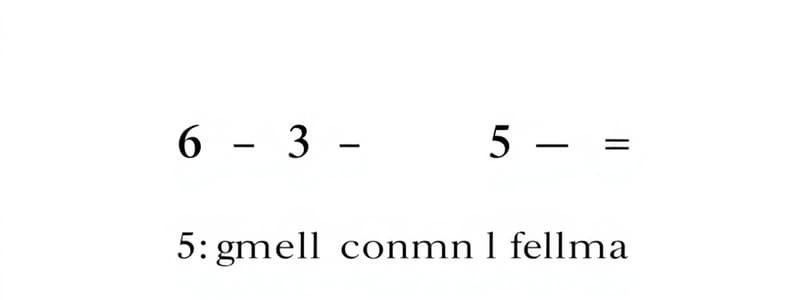Podcast
Questions and Answers
What is an algorithm?
What is an algorithm?
A series of well-defined steps which gives a procedure for solving a type of problem.
What is a lemma?
What is a lemma?
A proven statement used for proving another statement.
Euclid's division algorithm finds the Highest Common Factor (HCF) of two given positive integers.
Euclid's division algorithm finds the Highest Common Factor (HCF) of two given positive integers.
True (A)
What is the condition for the remainder in Euclid's division lemma?
What is the condition for the remainder in Euclid's division lemma?
In the equation a = bq + r, the integers q and r are uniquely determined for any given integers a and b.
In the equation a = bq + r, the integers q and r are uniquely determined for any given integers a and b.
What are the integers q and r called in Euclid's division lemma?
What are the integers q and r called in Euclid's division lemma?
Flashcards
Euclid's Division Lemma
Euclid's Division Lemma
Given positive integers 'a' and 'b', there exist unique integers 'q' (quotient) and 'r' (remainder) satisfying a = bq + r, where 0 ≤ r < b.
Lemma
Lemma
A proven statement used to prove another statement.
Algorithm
Algorithm
A series of well-defined steps that solve a specific type of problem.
Highest Common Factor (HCF)
Highest Common Factor (HCF)
Signup and view all the flashcards
Euclid's Division Algorithm
Euclid's Division Algorithm
Signup and view all the flashcards
Fundamental Theorem of Arithmetic
Fundamental Theorem of Arithmetic
Signup and view all the flashcards
Prime Factorization
Prime Factorization
Signup and view all the flashcards
Lowest Common Multiple (LCM)
Lowest Common Multiple (LCM)
Signup and view all the flashcards
Prime Number
Prime Number
Signup and view all the flashcards
Composite Number
Composite Number
Signup and view all the flashcards
Rational Number
Rational Number
Signup and view all the flashcards
Irrational Number
Irrational Number
Signup and view all the flashcards
Theorem 1.3
Theorem 1.3
Signup and view all the flashcards
Theorem 1.4
Theorem 1.4
Signup and view all the flashcards
Terminating or Repeating Decimal
Terminating or Repeating Decimal
Signup and view all the flashcards
Non-terminating, Non-repeating Decimal
Non-terminating, Non-repeating Decimal
Signup and view all the flashcards
Prime Factorization and Decimal Expansion
Prime Factorization and Decimal Expansion
Signup and view all the flashcards
Real Number
Real Number
Signup and view all the flashcards
Division Operation
Division Operation
Signup and view all the flashcards
Even Number
Even Number
Signup and view all the flashcards
Odd Number
Odd Number
Signup and view all the flashcards
Integer
Integer
Signup and view all the flashcards
Function
Function
Signup and view all the flashcards
Exponents
Exponents
Signup and view all the flashcards
Base Number
Base Number
Signup and view all the flashcards
Addition
Addition
Signup and view all the flashcards
Subtraction
Subtraction
Signup and view all the flashcards
Multiplication
Multiplication
Signup and view all the flashcards
Division
Division
Signup and view all the flashcards
Negative Number
Negative Number
Signup and view all the flashcards
Natural Numbers
Natural Numbers
Signup and view all the flashcards
Integers
Integers
Signup and view all the flashcards
Study Notes
Euclid's Division Lemma
- Euclid's division lemma is a technique used to compute the highest common factor (HCF) of two given positive integers
- Given positive integers a and b, with a > b, there exist unique integers q and r, such that a = bq + r, where 0 ≤ r < b
- The integers q and r are called the quotient and remainder, respectively
- This result has been known for a long time, but Euclid's division algorithm was first recorded in Book VII of Euclid's Elements
- The steps involved in applying Euclid's division lemma are as follows:
- Apply Euclid's division lemma to c and d such that c > d.
- If r = 0, d is the HCF of c and d.
- Continue the process until the remainder is zero. The divisor at this stage will be the required HCF.
Example
- A trader was selling eggs and had a dispute with the Panchayat
- The trader was asked how many eggs were there in total given the following conditions:
- The number of eggs, when counted in pairs, leaves a remainder of 1.
- The number of eggs, when counted in threes, leaves a remainder of 2.
- The number of eggs, when counted in fours, leaves a remainder of 3.
- The number of eggs, when counted in fives, leaves a remainder of 4.
- The number of eggs, when counted in sevens, leaves no remainder.
- The number of eggs must be less than 150.
- The solution would be found by working backwards to solve for the number of eggs
Studying That Suits You
Use AI to generate personalized quizzes and flashcards to suit your learning preferences.




